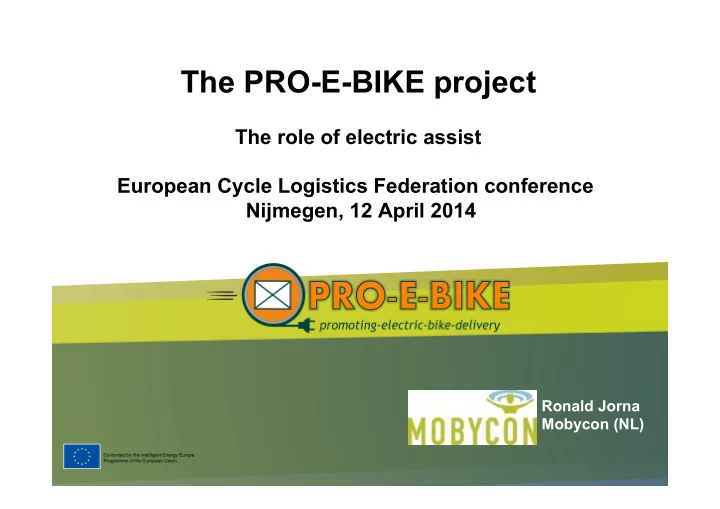

The PRO-E-BIKE project The role of electric assist European Cycle Logistics Federation conference Nijmegen, 12 April 2014 Ronald Jorna Mobycon (NL)
Contents ¡ • About ¡Mobycon ¡ • PRO-‑E-‑BIKE ¡project ¡(partners, ¡goals, ¡target ¡groups) ¡ • State ¡of ¡the ¡art ¡review ¡ • Examples ¡of ¡use ¡of ¡e-‑bikes ¡in ¡freight ¡transport ¡ • Trends ¡and ¡policies ¡ • First ¡results ¡of ¡PRO-‑E-‑BIKE ¡pilots ¡in ¡the ¡Netherlands ¡
About ¡Mobycon ¡ • Founded ¡in ¡1986 ¡ ¡ • Consultancy ¡company ¡in ¡the ¡ domain ¡of ¡Traffic, ¡Transport ¡ and ¡Mobility ¡issues ¡ ¡ • Clients ¡on ¡all ¡government ¡ levels ¡
PRO-‑E-‑BIKE ¡ • PromoQon ¡of ¡clean ¡and ¡energy ¡efficient ¡ vehicles ¡for ¡professional ¡use ¡ ¡ ¡ • Focussed ¡on ¡e-‑(cargo)bikes ¡and ¡e-‑scooters ¡ ¡ • Delivery ¡of ¡goods, ¡passengers ¡and ¡services ¡ ¡ • Co-‑funded ¡by ¡Intelligent ¡Energy ¡Europe ¡ Programme ¡
Partners PRO-E-BIKE • Energikontoret Ost (Sweden) • Mobycon (The Netherlands) • ECF (Belgium) • Singergija (Slovenia) • POLIEDRA (Italy) • ITENE (Spain) • Occam (Portugal) • Lombardo (Italy) • IST (Portugal) • EIHP (Croatia, project management)
PRO ¡E-‑BIKE ¡goals ¡ • To ¡build ¡understanding ¡ ¡ • To ¡raise ¡confidence ¡in ¡e-‑bike ¡technology ¡ ¡ • Result: ¡ ¡ • ¡Behavioural ¡change ¡ • ¡Market ¡uptake ¡ • ¡Development ¡of ¡policies ¡at ¡local ¡level ¡
Target ¡groups ¡ • Delivery companies • Public administration/ local authorities • Citizens
Results ‘state of the art’ review • Review of trends • Identification of best practices • Identification of policies
Trends (1) Technology • speed pedelec (up to 45 km/h) • lowering recharging times • extending capacity for increased range • weight reduction of parts • IT-extensions (navigation, smartphone, etc.)
Trends (2) Three types of companies and logistics ¡ ¡ models: • Logistics companies ¡ ¡ ¡ ¡ ¡ ¡ • Bike couriers ¡ ¡ ¡ ¡ ¡ ¡ • Home delivery ¡ ¡ ¡ ¡ ¡ ¡ ¡ ¡
Best practices 2 dimensions: • Transport of freight, passengers, services • Pedelec, e-cargobike, e-scooter freight passengers services pedelec 8 5 3 e-cargo-bike 29 3 3 e-scooter 1 4 1
Examples (1) Posta Slovenia • Deliveries in the city centre of Ljubljana, Koper and Celje • 41 e-cargobikes, 20 e-scooters, 3 e-vans • More older employees can do deliveries • Contribution to internal goals for reduction of pollution • Maintenance is a problem due to lack of suppliers of parts in Slovenia • Similar example: Belgian Postal services
Examples (2) BASF (e-bike) • Ludwigshafen site • Replacing scooters with e-bikes • Supporting innovative mobility • Employees are content • Lower costs, less pollution
Examples (3) DHL • Introducing ‘parcycles’ • Meeting internal goals on pollution and noise reduction • Client perception! • Logistical process must be suitable • FedEx (Paris) and TNT (Brussels) are comparable examples
Examples (4) MOVEBYBiKE • Since beginning 2012 • Operating 6 e-bikes • Malmoe, Lund, Helsingborg, Gothenburg and Stockholm • Last mile delivery of newspapers and transporting furniture for people moving
Pilot projects in the Netherlands
First lessons learned • Professional use of e-bike adds to the company’s image and CSR • Use of e-bike cheaper than car or scooter but more expensive than normal (cargo)bike • In urban areas the e-bike can be more efficient than other transport modes • Hills limit the range of the e-bike • Easier to replace 1 van in a fleet than replacing the only car of a one-man company.
Economic sustainability • Low costs (purchase, • Loading capacity insurance, tax, maintenance) (weight, volume) • No restrictions in urban areas • Limited range • Sustainable (congestion, • Inclusion in logistical emissions, noise) process • Client perception/image • Weather influences • Personnel (no driver license • Dependent on physical needed, improved health, fitness of employees other type of employees) • Simpler infrastructure needed
Policies Policies to promote use of e-bikes: • Reduced emission zones • Time windows for freight vehicles • Appropriate bicycle infrastructure (bicycle lanes (also suitable for cargo-bikes), parkings, charging stations, …) • Fiscal incentives and subsidies • Promotion campaigns (including testing of e- (cargo)bikes)
Recommend
More recommend